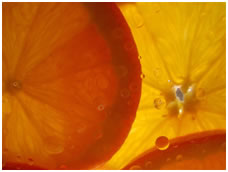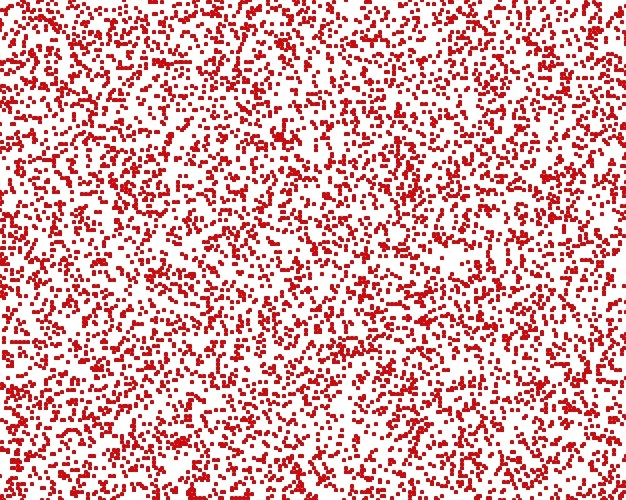Measuring Acidity
 Any time that a measurement can vary over many orders of magnitude, that's a candidate
for using a log scale.
Any time that a measurement can vary over many orders of magnitude, that's a candidate
for using a log scale.
One example is the pH scale, which shows the concentration of hydrogen ions [H+] in a water-based solution. The concentration can be as high as 1 mole of H+ for every 10 L of water (extremely acidic), or as low as 1 mole of H+ for every 100,000,000,000,000 L of water (extremely basic). For a refresher on describing chemical quantities in moles, see the MathBench module on Calculating Molar Weight.
Instead of counting out the zeros every time, we use a log scale. pH is defined as the negative log of the H+ concentration.
extremely acidic : [H+] = 0.1 moles/L :
pH = −log(0.1) = 1
extremely basic : [H+] = 0.00000000000001 moles/L :
pH = −log(0.00000000000001) = 14
Imagine that the space below shows a very tiny quantity of water (9 x 10-15 liters, to be exact). Clicking on the buttons will show you the visual representation of pH 1 (super acidic) through 5 (still slightly acidic).
Visualizing pH...

Show me pH =
Concentration of H+ is ?
log(?) = ?
As a general rule, when you add 1 to a log number, it's the same as multiplying the unlogged measurement by 10:
1 on a log scale corresponds to 10 on an arithmetic (linear) scale
2 on a log scale corresponds to 100 on an arithmetic (linear) scale
3 on a log scale corresponds to 1000 on an arithmetic (linear) scale
and so on...
It works a little differently with pH, because pH is the negative log of concentration. So, every time we SUBTRACT a single pH unit (like going from 2 to 1), we multiply H+ by 10.
Unfortunately, we can't get any less acidic than pH=5 on the applet above, because we'd have to make the screen huge!! To get a pH of 14, we'd need the screen to be more than 10,000 times taller and 10,000 times wider, and this humongous screen would contain only a single dot.
Copyright University of Maryland, 2007
You may link to this site for educational purposes.
Please do not copy without permission
requests/questions/feedback email: mathbench@umd.edu